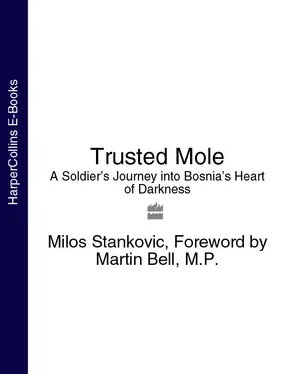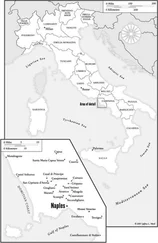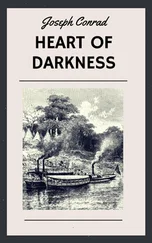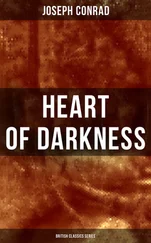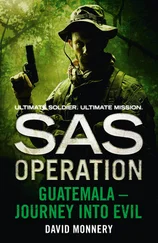1 ...6 7 8 10 11 12 ...15 ‘He all right?’ I asked, approaching.
The one on the left shot me a glance. ‘He had a bad time of it this afternoon. This last lot …’ He didn’t bother finishing the sentence.
‘He’ll be fine,’ chimed in the second, which really meant ‘leave us alone’. I was only too glad to. It was unnerving seeing someone’s soul stripped bare, so starkly reminding me of my own terror.
I thought the Serbs were bound to shell us again so I didn’t bother taking anything off. Somehow I managed to cram myself into the sleeping bag still wearing the flak jacket, but I couldn’t zip the bag up over the bulk. It was a wretched night and I suppose I was still edgy. I dozed fitfully on the cold concrete while freezing air seeped into the bag. They had the last laugh: there was no more shelling that night.
Breakfast was a subdued affair. I found a place opposite Seb at one of the wooden trestle tables in the makeshift canteen in one of the halls. He was talking about the shelling, banging on as if none of us had been there. I suppose it was just a delayed reaction or just his way of getting it out of his system but it was irritating and he was making me distinctly nervous. I didn’t need an action replay over breakfast.
‘Seb, it’s over, it’s passed. Just drop it.’ It was precisely the wrong thing to say. He rounded on me angrily.
‘Yeah, that’s right, rufty tufty Para. Easy for you to play it cool, especially if you’ve been through it loads of times. For some of us it was our first time.’
I was stunned by his presumption. Suddenly, I didn’t feel like breakfast, got up and walked off. In the following six months Seb and I could barely stand to be in the same room as each other. The atmosphere would always be tense and uncomfortable. Was it because he thought I’d seen him lose it that night? Who knows. It’s strange and sad what these things do to people.
Before we left Brigadier Cumming inspected the night’s damage. In the compound where we’d taken cover in the Spartans stood a row of four-tonne trucks some thirty metres forward of the APCs. Nearly all were shrapnel-damaged and sagging forlornly on punctured tyres. The walls of the warehouse were deeply scarred. To one side of the warehouse two Land Rovers had been completely destroyed. A shell had landed fifteen metres on the other side of the compound fence and shrapnel had ripped through their soft aluminium sides, turning them into sieves. It was a sobering sight.
Not one shell had landed within the compound. Further analysis revealed that the shells had landed some 100 metres forward of the camp with the nearest landing about seventy metres away. How could the Serbs have managed to converge all their guns on one spot and yet drop all the rounds short? Maybe it had been deliberate, a warning – stop allowing the Croats to fire their guns from behind UN buildings. Another suggestion was that they’d intended to hit the warehouse but had been working from old and inaccurate maps. I doubted it; they’d recorded that particular DF during the day and would have known to ‘add one hundred’.
In all some thirty-three 152mm shells had been fired that night. Astonishingly, no one had been hit. Two things had saved us. The first was the row of four-tonne trucks which had absorbed some of the shrapnel, the second that the Serbs had been using old stocks of shells which had burst into large lumps of jagged metal. Although these looked menacing, they travelled less far and quickly lost their energy. Modern artillery rounds fragment into splinters one third of the size and travel three times further. We’d been lucky. The TSG incident so disturbed the politicians back home that a Naval Task Force, including a regiment of 105mm light guns, was quickly dispatched to the Adriatic.
We departed TSG at 0900 hours. Brigadier Cumming was keen to get back to Tac in Fojnica as quickly as possible. Another crisis was brewing. While we’d been racing down to TSG, a French APC transporting the Bosnian Deputy Prime Minister, Hakija Turajlic, to the airport in Sarajevo had been stopped by Chetniks, Serb irregulars. After a stand-off, they’d gained access to the APC through the rear door, machine-gunned the interior and murdered the Deputy. The UN’s future in Bosnia looked short-lived.
We crossed the almost featureless Duvno plain before picking up the road which ran along the plain’s eastern edge. At the Lipa checkpoint the Brigadier decided that we’d reach Fojnica quicker if we took Route Square along the Dugo Polje valley and thence drop down off the ‘mountain’ to Jablanica. It was a favourite route and spectacularly beautiful. We drove for half an hour in silence. Eventually Corporal Fox broke it.
‘Well, I don’t know about you … ,’ he drawled, addressing no one in particular,‘… in a way I’m glad we went there, but I wouldn’t ever want to go through that again.’ We said nothing. There was nothing to say. He’d spoken for us all.
We’d begun the descent into a breathtakingly steep valley – a wild, almost prehistoric place of towering black mountains, jagged rocks and shimmering ice, both bleak and forbidding. Some of the previous night’s terror entered my thoughts. How on earth had I got myself into this mess? Almost a year earlier, amid the arid wastes of Iraq and Kuwait, I’d been desperate to get to Yugoslavia. Now I wasn’t quite so sure I hadn’t made a terrible mistake – one all of my own making.
October 1997 – Ian, UK
I’m sitting down, leaning forward, my stomach a fire of anger and fear. Legs crossed, one foot kicking uncontrollably.
I’m fiddling like mad with my watch strap. I can feel the fire welling up about to engulf me. I’m struggling to suppress tears of rage and frustration. I’m trying to explain but I’m just burbling incoherently. The man opposite me is a saint. I’ve met him before – in a past life. I mean, he’s seen me before, after the first time. He’s a lieutenant colonel, also a psychiatrist, the only one worth seeing. His name is Ian. He’s got a clipboard and a pen, but he’s not writing. He’s just looking at me, listening to me ranting.
‘I should have come to see you a long time ago, but I couldn’t. You just can’t … I mean, you try and get on with your life, put the past in a box and sit on the lid by busying yourself … of course, they’ll always tell you that the support is there – all you have to do is ask. But it’s not really there at all … let me tell you, your sort of help is virtually inaccessible.’
‘How do you mean, Milos?’ He’s frowning.
‘It’s the culture … it’s a cultural thing.’
‘Culture?’
‘Culture, macho Army culture. Can you understand what I’m saying? Y’know, you’re a major in the Parachute Regiment or whatever. In that culture you can’t show weakness or flaws. No one can. You’re supposed to be strong. So you wander around keeping it all inside, pretending everything’s okay … you bluff those around you, you bluff yourself …’ I’m close to tears now, ‘… but deep down you know you’re not well. You’re ill and need help but you can’t ask for it because you’re trapped in a straitjacket which is put on you by your peers, by the culture, by yourself … because you are the culture …’
‘So, why are you here now, Milos?’ his voice is soft and gentle, probing. ‘Why did you ask to see me?’
I stare out of the window at the sea. Why indeed? It’s choppy and green-grey. The waves are flecked with white horses. Why? The nightmare of the last five days flashes through my mind. It had been an unimaginable nightmare – it still is – and had it not been for Niki, my girlfriend, I’m not sure I’d be sitting here with Ian.
Читать дальше
